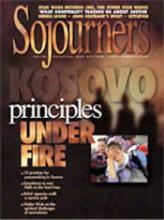Leslie Stahl: "We have heard that half a million children have died [as a result of economic sanctions against Iraq]. I mean, that is more children than died in Hiroshima. Is the price worth it?" Madeleine Albright: "We think the price is worth it." ---60 Minutes
March 6, 1999. Every day this week, the United States has bombed Iraq. Last evening, several civilians were killed in the north by U.S. F-15e fighter bombers. Im on my way to Baghdad to listen, learn, and witness the suffering of the Iraqi people, victims of U.S. bombs and economic sanctions. Our Fellowship of Reconciliation delegation includes two Nobel Peace Prize laureates, Mairead Corrigan Maguire of Northern Ireland and Argentinian Adolfo Perez Esquivel, and five others.
These days, the road to peace for many of us begins on this long desert road to Iraq. Even with the war in the Balkans, Iraq is the number one enemy of our nation. With a population of 23.5 million people, Iraq was a prosperous nation 10 years ago, with first-rate medical and educational facilities. Since the economic sanctions imposed in August 1990 and the ensuing Gulf war and bombardments, Iraqs civilian infrastructure has been systematically destroyed. Except for Bill Richardsons short trip to secure the release of a U.S. pilot, not one U.S. member of Congress or elected official has visited Iraq since 1990.
According to the World Health Organization, more than one million Iraqi civilians have died since sanctions were first imposed. Six thousand children under 5 die each month because of the economic sanctionsapproximately 200 children a dayand a million children under 5 are chronically malnourished.
Read the Full Article
